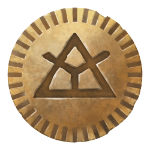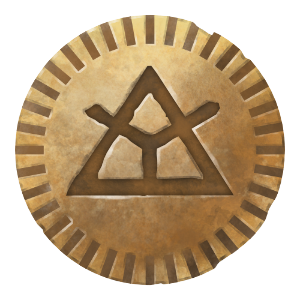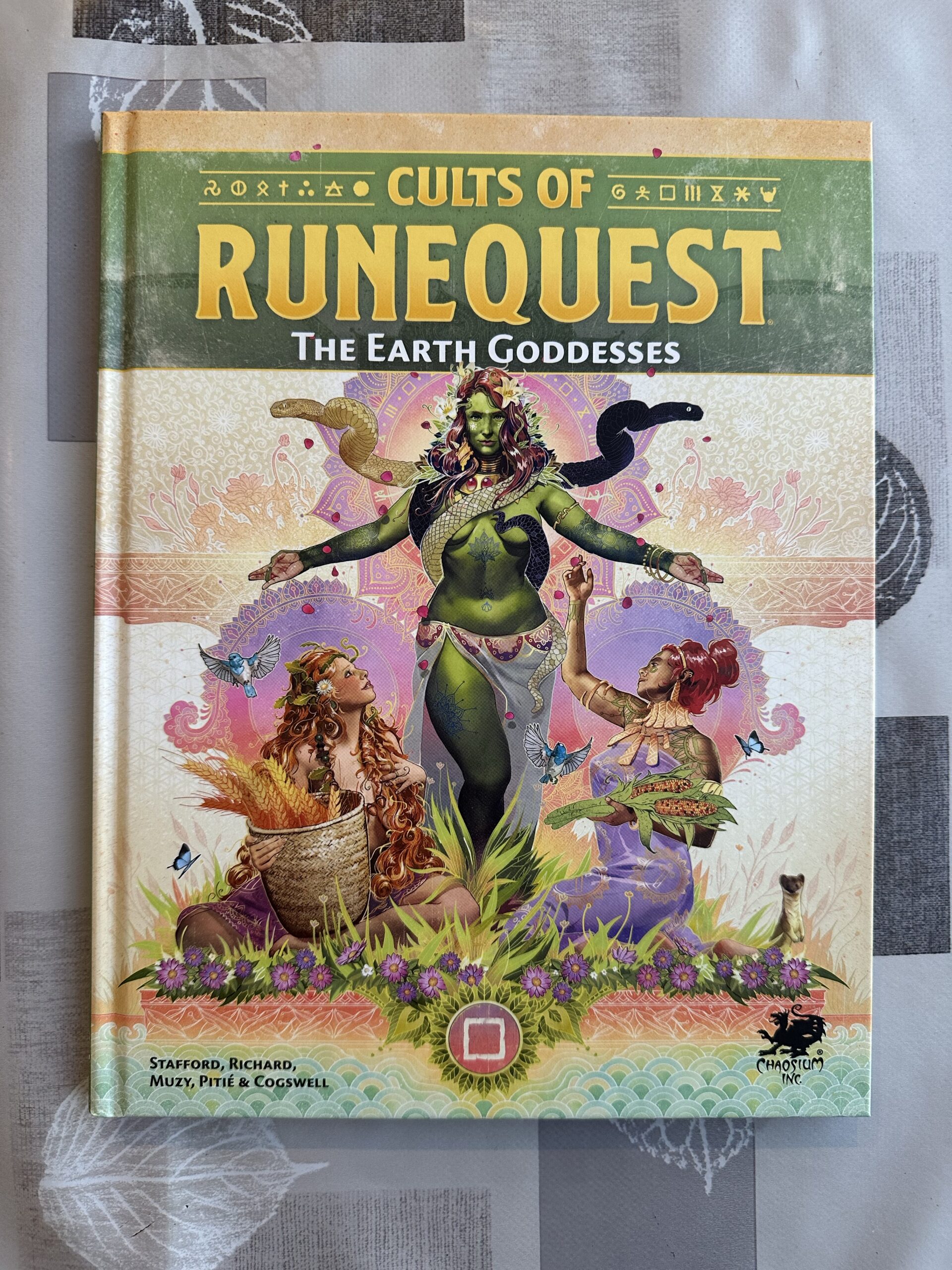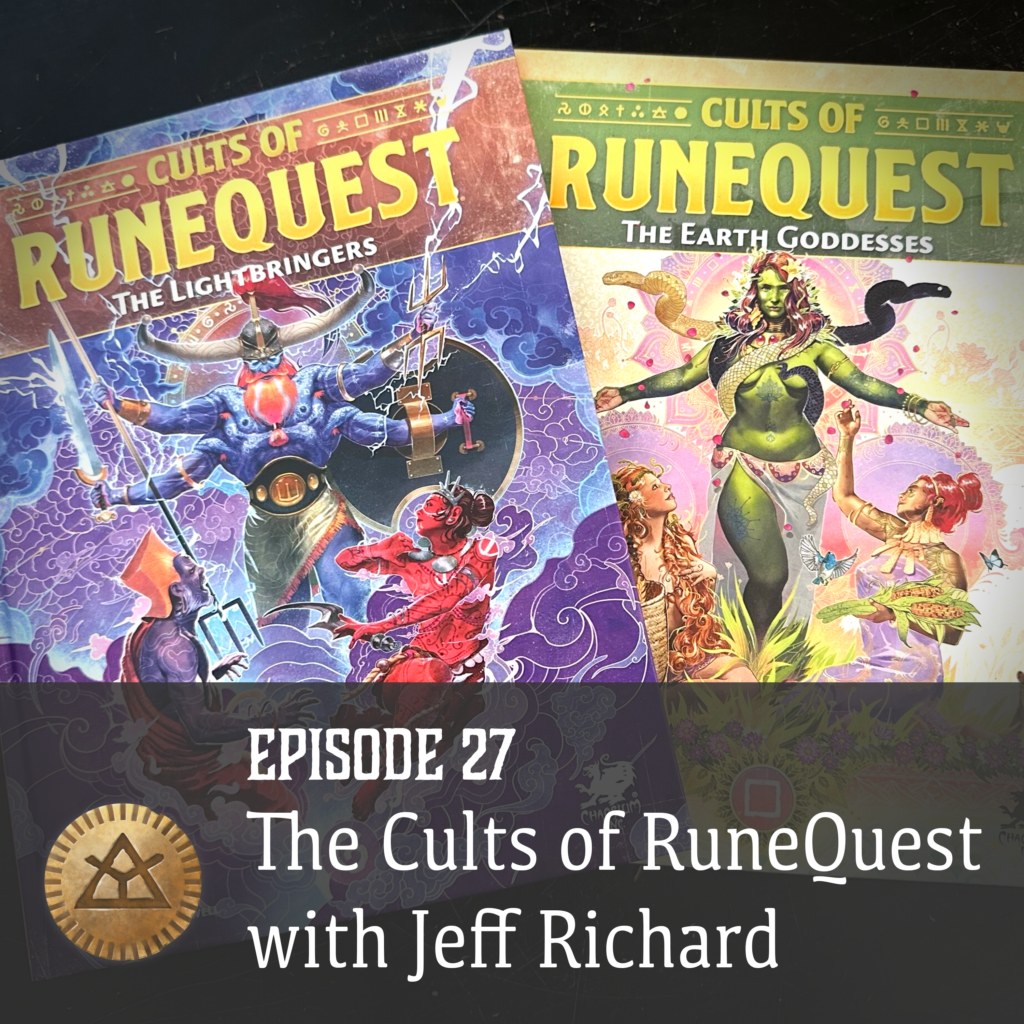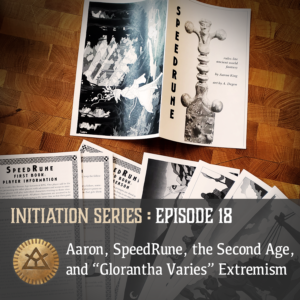
For this new initiation series episode we are happy to welcome Aaron King!
- Aaron is the designer of SpeedRune, an OSR-esque rules-light game of Gloranthan community adventures. Get it here, it’s free!
- There are even now a few supplements available for SpeedRune, including some things we discuss in this episode. Check out Aaron’s itch.io store!
- Aaron also co-hosts a TTRPG podcast called “RTFM” with Maxwell Lander. If you’ve ever dealt with the Linux and open-source community in your life, you definitely know what this acronym stands for… Anyway, Aaron and Maxwell read and discuss various game books, including RuneQuest in their September episode.
- You can also find Aaron on Twitter (while that still exists).
Show Notes
Things we discuss in this episode include:
- Minnesota being the “real birthplace of RPGs” (since that’s where Dave Arnison is from), and not Wisconsin (where Gary Gygax lived).
- Reading Dragon Magazine and figuring out how RPGs work from that.
- Playing D&D 3.5 and 4.0, and then moving on directly to full-on narrative games like Fiasco, Polaris, Firefly (and the Cortex system), Powered by the Apocalypse games, and more.
- Discovering Glorantha with King of Dragon Pass and loving the setting, with its faction play.
- Reading RQ2 Classic… but Aaron thought it was missing something, like it was referencing things the reader didn’t know.
- Finding a copy of HeroWars, which Aaron felt was “more accessible”.
- Treating the Big Rubble as Fortnite.
- Getting some Second Age books from the old Mongoose RuneQuest line, and also the newer RuneQuest Glorantha rulebook.
- A lot of players are put off by the size of Glorantha, and expectations of “homework” don’t help. See also: how the Marvel Cinematic Universe now “forces” you to watch many other movies and TV series to follow what’s going on.
- Trying to simplify Glorantha to just “you are part of a clan”. Introducing elements one by one from there.
- Aaron loves ducks in comics, and loves ducks in Glorantha.
- Aaron runs his campaign using SpeedRune, a free rules-lite system that he wrote. It’s inspired by Sledgehammer, a simplified version of Warhammer FRPG, and Cybermetal 2012. Player rules are on the character sheet, like in PbtA games.
- The appeal of seasonal games, like Pendragon and Sagas of the Icelanders, and the passage of time with PCs becoming old and having kids. This lets players make decisions on a grander scale of time.
- Expansions to SpeedRune are coming (some of them having been released since we recorded), including more Runes, and a non-Gloranthan expansion that lets you play in a campy ancient world setting inspired by the classic Xena/Hercules TV series.
- Speedrune is easily hacked, and able to bring material from other bronze age fantasy sources besides Glorantha.
- In SpeedRune, the GM never rolls. The D100 roll defines success, but also one dice is used for damage and the other for “fate”. Combat is pretty quick, but healing is not as easy as in RQG so there’s a slow decline over a season, inciting the player to go in downtime. Because rolls are all player-facing, there is not sitting around while the GM rolls attacks and parries and damage and location for each of the 8 orcs attacking the players.
- The community gets a character sheet like in Blades in the Dark or HeroQuest Glorantha, which is used during downtime actions.
- Building your clan and finding a campaign framework.
- Being a “Glorantha varies extremist”. Aaron starts very small. He lets the players build their community and participate in the world-building, at least a few days’ travel around of the adventurers’ home. The Lunar Empire probably exists but Aaron also wants to include other fun things like Tanith Lee’s “ancient horny demon kings that come at night”.
- Aaron likes the Second Age books from the Mongoose RuneQuest line written by Robin Laws. He especially likes the idea of the magic religious pyramid scheme that the Empire of the Wyrms Friends setup.
- Using Glorantha as a big sandbox of cool ideas rather than as canon… possibly because it’s still all new. Aaron has encyclopedic knowledge of other settings like the Elder Scrolls, so it’s not a universal approach. And it probably also explains why Aaron got hooked with Glorantha, since a lot of it has influenced the world of the Elder Scrolls via people like Ken Rolston.
- One crazy element from Aaron’s Glorantha: an Iron God had its heart pulled out by a jealous dirt god. The heart was grabbed by a goose that was flying by, and it bled over the ground, leaving veins of iron in the ground. Where the goose dropped the heart is a large crater with a big giant metal heart in it, which some people try to exploit and guard jealously.
- Heroquesting as a reversal of roles between GM and player. Aaron says that “Heroquesting seems difficult” (ho ho ha ha). In SpeedRune, Aaron has the GM roll, and the players not, which is a total reversal of the usual mechanics. In fact, during Heroquests, the GM has to roll above the player skills, like a mirror reality. Aaron isn’t super happy yet about it however, and might tweak it further.
- One PC in Aaron’s game seems to have ascended as a star.
- Aaron like the multiple points of view of the people of Glorantha.
- Having a world reference outside of the mechanics. Aaron has good hopes about the (since then released) Cults of RuneQuest Prosopaedia. However, we also recommend the Glorantha Sourcebook to him, and maybe Trollpak since he likes trolls.
- We briefly talk about the very old RQ2 Source Pack books with several pages of stats. We also talk about Balastor’s Barracks and its nonsensical dungeon. We even talk about old horrible comicbooks drawn by Rob Liefield.
- Aaron reiterates his love for the Robin Laws/ Second Age books…. and even possibly recommends the main one as a first contact with Glorantha!
- There’s a trope of “ancient amazing empires long gone” in fantasy settings, and sometimes you do want to play in those times. If these were indeed amazing times, maybe that should be when and where games should be set! And these old MRQ books allow for that.
- The main MRQ Second Age book also provides information in a contained way, in one book, whereas a lot of Glorantha information is usually spread across many other books in other product lines. This Second Age book might also show the weirdness of Glorantha better than other books.
- Aaron talks about being a weird obsessive kid who would read the Marvel Comics encyclopedia entries first, and then the comic books second, and sometimes be disappointed that a certain story arc wouldn’t be as cool as it looked in the encyclopedia.
- Aaron asks about elements for which the canon has several versions of events/truths/etc based on different people’s perspectives, but no “official, objective answer”. Ludo talks about the origin of the Tusk Riders. Joerg briefly mentions the end of the Second Age, some other things like the nature of Yelmalio, and myths in general.
- We end as Aaron literally orders Trollpak, and talk about the myth of trolls as political refugees.
Credits
The intro music is “Dancing Tiger” by Damscray. The outro music is “Islam Dream” by Serge Quadrado. Other audio is from the FreeSound library.
Podcast: Play in new window | Download (29.8MB)
Subscribe: Apple Podcasts | Spotify | RSS | More
